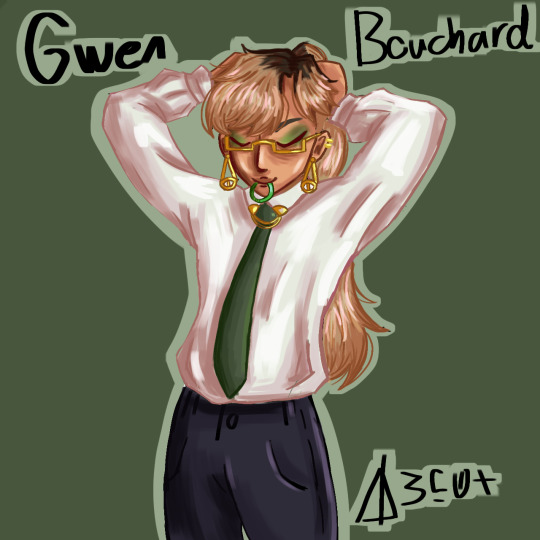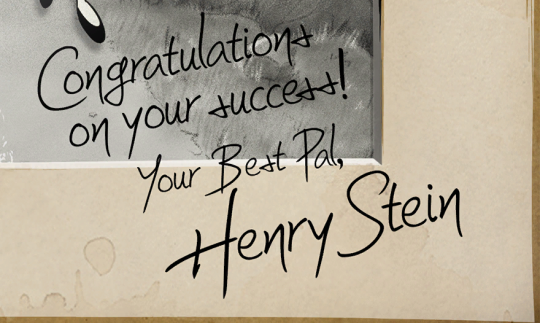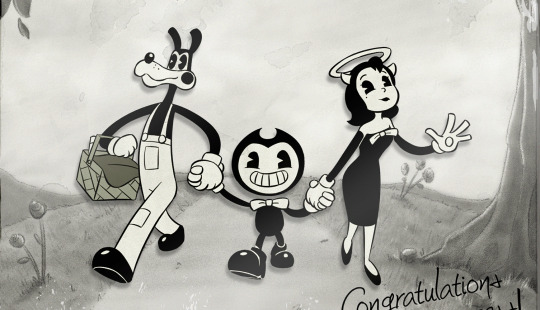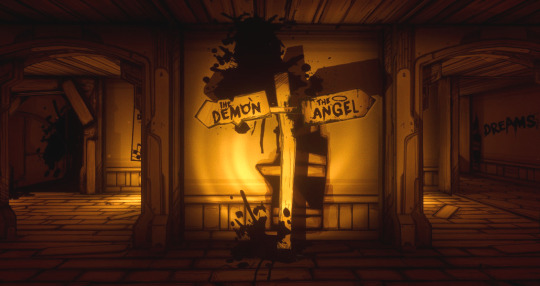#If this gets 5 notes ill draw her and alice holding hands
Text

Gwen bouchard my love
#gwen bouchard#gwendolyn bouchard#tmagp vague#tmagp#tmagp spoilers#tmagp fanart#tmagp gwen#tma#the magnus protocol#the magnus archives#The magnus protocol fanart#I love gwen sm#If this gets 5 notes ill draw her and alice holding hands#Or maybe even kissing
179 notes
·
View notes
Text
Queer Subtext in The Illusion of Living - Part 5/5
It’s time to address the elephant in the room: Henry.
Joey tries very, very hard to ‘no homo’ his relationship with the man:
“His presence was helpful, I can happily admit, but his absence was even more so. Not having him at the studio ended up being one of the best things that could have happened to it. Of course, the funny thing is, I couldn't have not had him without having him in the first place. Just like you can't appreciate the light if you haven't spent time in the dark, so too does a person's absence become clear only if he has been around.” TIOL, page 154
“A letter from Henry. You might not think I'd keep such a thing, but I do. I have no ill will toward the man as you know. Him leaving, as I said, was the best thing that could have happened to the studio. His letter reminds me of that.” TIOL, page 218
The lady doth protest too much, methinks.
The only hint we get regarding Joey’s true feelings for Henry is the following note by Nathan:
“NateA: Joey has always been a professional person, far more so in many ways than me. That is why this section of the book is so forgiving of the man who abandoned the studio he helped create. Joey can't help but see the good in people. That being said, as a good friend of Joey's, I know that Henry's departure was a great upheaval for him and a great personal betrayal. Joey never truly forgave Henry, and I don't think he should have felt obligated to. The fact that Joey is so gracious in this part of the book is a reflection of his incredible generosity in allowing Henry Stein to be stainless in the eyes of history. I think, had he lived longer, Joey might have in later years called it his greatest illusion.” TIOL, page 155
I’m very surprised by the harshness in Nathan’s tone here. Especially since Henry appears to believe that he and Joey have parted on good terms, and Joey admits that they have continued to exchange letters for a while after Henry’s departure. We’ve also seen Henry’s note to Joey in the game, and it comes across as warm and supportive:

It really doesn’t sound like anything ugly happened between him and Joey. So then why are both Joey and Nathan convinced that Henry is a monster?
While I can believe that Joey is pathetic enough to consider anyone who slights him his worst enemy, Nathan comes across as a more level-headed person. So for him to voice his approval for Joey’s petty grudge must mean that he knows something that we don’t. But what could it be?
Honestly, nothing else comes to mind except for romantic heartbreak. It’s the only thing that could justify a man holding such a deep grudge for so many years. This isn’t Joey’s first friendship that grew apart over the years - his army friends have moved on with their life as well. It’s a normal part of life and there’s nothing in TIOL that would suggest Joey is unable to cope with that. We also know that the studio did fine for quite some time after Henry’s departure, so it’s not like Henry left Joey deep in debt. Henry wasn’t even the only animator at the studio:
“When the studio opened I surrounded him with artists of all skill levels, and the Writing Department had its own de facto leader in Mr. Hemmings, and so the whole of Creative was well managed for that first year of the company before I had to part ways with Henry.“ TIOL, page 155
And so we’re left with only one rational explanation: that Joey isn’t so much hurt by Henry leaving his job, as by the fact that Henry left specifically for the sake of his marriage.
Try as I might, I found no reference to Linda in TIOL. Even though Joey claims to have been friends with Henry for many years, he makes zero mention of ever having met Linda. While there are some hints that Henry wasn’t yet married to her at the time when he and Joey opened the studio together (such as the fact that he claims he hasn’t seen her in “days” even though he presumably slept at home, implying that he and Linda weren’t living together at the time. A shopping list among his notes in the Handbook also suggests that he cooked his own meals, which would be unusual for a married man with a demanding job), the two were already a couple by then, and must have known each other for a while already. Surely, as Henry’s friend, Joey would have met her?
Even when talking about Henry leaving, Joey uses a cryptic language:
“Henry left for his own reasons, and the correspondence between us became less and less. To be honest, it was almost like a weight off when he left. He had grown more sensitive as the studio became more successful and giving him pep talks had become exhausting for me. All the good qualities he brought, the hard work and diligence, were being undermined by a restless need for something different. Something that wasn't Bendy. I will never understand that drive. Bendy was and is perfection.“ TIOL, page 177
In DCTL Norman claims that Henry left to spend time with his wife. Why doesn’t Joey say that? It doesn’t make him look bad to admit that an employee left to enjoy a quiet family life. It’s almost like he refuses to acknowledge Linda’s existence at all. Like it’s too painful for him to speak of her.
Perhaps the “personal betrayal” that Nathan is referring to is related to Henry choosing a real family, over the “studio family”, and the possibility of having a real child, as opposed to a fictional one?
The symbolic image of Bendy as a child shows up multiple times in the game: for example the drawing from Henry appears to depict Bendy, Alice and Boris as a happy family, with Bendy holding onto their hands like a child would:

There’s also Alice using a womb imagery to describe the ink machine:

And of course, the final monologue is centered on Henry’s choice to pursue a family:

That monologue is very interesting if we assume Joey to be gay. Because a gay man would never have been able to follow Henry’s road. Gay!Joey could never choose to have a real family with a man he loved, because that option was denied to him by the homophobic society he was living in. The studio is the closest thing to a family that gay!Joey could ever hope to have.

And evidently, that was not enough for Henry.
If Joey’s indeed gay, that must have felt incredibly unfair to him - knowing that he had no chance of happiness in marital bliss from the start, through no fault of his own. This would explain his desire to create a real, living, breathing Bendy, no matter the cost, just to prove to Henry that Joey’s “child” can be just as real as the one Linda could give him.
“Bendy was Joey's child, and he felt just as strongly about Bendy as I feel about my flesh-and-blood son.“ TIOL, page 2
This idea of an illusory choice very much resembles the choice between the Angel Path and the Devil Path in Chapter 3. It’s the only choice that Henry ever gets to make in the game, yet no matter which way he chooses, he still ends up in the same corridor. Some of the golden messages highlight his helplessness:

The symbolic meaning of the choice between the Angel and the Devil also shows up TIOL. There’s a scene in the book, where Joey writes a play about an Angel and a Devil fighting over the soul of a human man. Eventually, the Devil confesses that he doesn’t want the human to make his choice, because then one of them would have to leave. The play was supposed to end with the man making his choice, but according to Joey they lacked a third actor, so the ending was never played out.
I believe that the play is symbolic of the relationship between Henry and Joey, specifically with regards to Henry choosing a relationship with Linda over his friendship with Joey.
There are several reasons that lead me to believe this:
The human in the play making a choice between the Angel and the Devil is reminiscent of Henry choosing between Devil Path and Angel path in BATIM.
The play highlights that the Devil is on the left side of the human, while the Angel is on his right side:
“ANGEL: Spending my time with a devil has been an enlightening experience. Working with you over these years with you sitting on that left shoulder, so far and yet so near, all our debates, they were invigorating for the spirit.
DEVIL: I won't miss you! Fighting all the time, trying to trick you into agreeing with me, trying to push you off that right shoulder of yours. The violence and the anger. I won't miss it at all!”, TIOL page 89
Much like the Devil Path is on the left side in the game, while the Angel path is on the right side:

The Devil is obviously a stand-in for Bendy. Joey even dances on the stage at one point, and one of Bendy’s nicknames is “The Dancing Demon”. Joey also claims that the Devil from the play was an inspiration for Bendy:
“Let's start with the basic idea of a cartoon.You need a main character. Someone who has adventures and who the audience relates to." I did. I needed that. I needed a character who didn't just reflect the general population back to itself, but a more exciting version. I had no interest in moralizing, besides I didn't think moralizing was particularly realistic. People don't see the world as one populated by do-gooders. I thought of the angel in my play. She could never be a lead character. The devil on the other hand…” TIOL, 165
The fact that Joey claims the ending was never played out is strongly reminiscent of the missing ending of the Tombstone Picnic
It’s possible that Joey is lying about the ending not having been played out, to hide Henry’s role in the success of the play, much like he removed his part in Tombstone Picnic. After all, what would be the point of writing a play for 3 actors, when you only have 2? Why not ask someone to play the 3rd?
Although the play itself is centered more on the relationship between the Devil and the Angel, rather than their relationship with the human, there is still a strong queer symbolism in the play:
“Abby shifted nervously next to me the whole evening. She was in a dress for the first time in a long time, white and soft. I was pleased she'd come in character. For my part the only red thing I owned was a garish bow tie, so that was all I was able to contribute visually.” TIOL, page 82
The angel is played by a woman, who usually wears men’s clothing, but of course, the Angel being a symbol of Christian values couldn’t possibly be portrayed breaking the gender norms. She had to wear a dress, though Abby is clearly uncomfortable in it. She’s essentially performing heteronormative feminity. Next to her we have Joey as the Devil, dressed in a red bow tie, which as I’ve mentioned in the first part of this analysis, used to be a symbol of homosexuality.
This contrast between the uncomfortably heteronormative Angel and flamboyantly queer Devil is striking. It’s also very much in line with the views of the society in the 1920s. For something to be the symbol of purity and goodness, it has to be heterosexual, and the Devil is queer, because he’s also the symbol of sin.
That symbolism could be indicative of Joey’s own internalized homophobia. Back in his army days, his friends used to bully him for breaking gender norms. Joey likes to present himself as the hero, who was easily able to outsmart the bullies, but many of his later remarks in the book and in DCTL show that some of that attitude has left a deep mark on him.
The symbolism could also be intentional. Joey boasts about having personal ties to Noel Coward, a real life gay playwright, who was known for his many affairs with men, and for putting an ungodly amount of queer symbolism in his works:
“The old woman took a liking to me, and she was nice enough. Besides, her connections were incredible. She knew everyone, she even had the playwright Noel Coward come to stay with her whenever he was in town.” TIOL, page 144
There’s a lot of evidence pointing to the play being symbolic of Henry’s choice between his relationship with Linda and with Joey. But it’s also symbolic of Henry’s choice between Bendy, and a real child. The studio family, and a traditional family. Heteronormative relationship vs a queer relationship.
Although there’s no indication in canon that Henry might be bisexual, he doesn’t need to be. The game has beaten into our heads that the “choice” is an illusion. Henry was never going to choose the Devil, or at least that’s what Joey believes. Although we’re never told what choice the human in the play was going to make, we’re told that he was supposed to be dressed in white, which suggests that he chose the Angel.
“(The door stage right opens. A man all in white enters calmly and chooses a seat, brushes it off carefully and sits. He takes his hat off and holds it gingerly in his lap.) (Quiet.) (Curtain.) THE END” TIOL, page 91
That might be why the Devil in the play confesses that he doesn’t want the human to make his choice, fearing that one of them will have to leave once such a choice is made:
“DEVIL: You think he has made a choice?
ANGEL: It is possible.
DEVIL: Do you think he might be all bad?
ANGEL: I hope he is all good.
DEVIL: If he is all bad, my job here is done. If he is all good, you can go home.
DEVIL: Strange. If we win we also lose. You would think that would be something I would find delightful.
ANGEL: You would think I would love to make such a personal sacrifice.” TIOL, page 89
The line about a “personal sacrifice” is very interesting in this context. The Angel and the Devil clearly care for each other and for the human, and don’t want their relationship to come to an end. Though the Devil in the play seems to make gestures that the audience interprets as romantic in nature, Joey insists that it isn’t the case:
“I leaned in and placed a hand on Abby's knee. There was a gasp from someone in the audience, but I knew Abby wouldn't be flustered by it. That wasn't the nature of our relationship.” TIOL, page 89
It makes me wonder if perhaps Linda and Joey used to be friends at some point, and both competed over Henry’s attention.
There’s a much overused trope in fiction where two men compete over a woman, which ends up ruining their friendship. It would be really interesting and subversive to see a man and a woman competing over a man instead.
EDIT: I can’t believe I forgot to add this part:
"Joey, thanks for coming," said Henry, approaching from behind us. I turned to look at him He had dressed up for the event but every item of clothing looked slightly wrong. The sleeves of his shirt a bit short, his vest a bit long, his tie askew. He smiled, though, with such confidence that I couldn't help admire him. I still do.” TIOL, page 160
Joey fell for Henry’s smile, how romantic!
“We watched in silence as he worked. Despite his lack of genius, to this day, I will always say that watching Henry work was a real pleasure.“ TIOL, page 173
“It's fascinating. Henry was never the showman like I was. He didn't tend to be easily remembered by those who met him when we did business. I was invariably the face of the company, the one introduced first at a gala, the one to whom people slipped their business cards.Yet in the end he ended up setting up camp in this small corner of my memory. I can't deny that he is tied to the creation of Bendy, to the creation of the studio itself. That at one time, in one small apartment, one too warm evening, we had shaken hands. That once upon a time we had been partners. He'll always be there, in the dark recesses of my mind. Always linked to me that way. Funny how the forgettable man is now forever in my mind” TIOL, page 177
#Bendy and the Ink Machine#batim#bendy: the illusion of living#joey drew#Henry Stein#Linda Stein#dreamfisher certified#nathan arch
261 notes
·
View notes